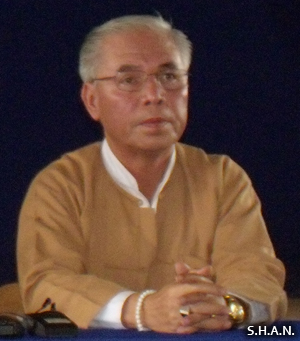So far Naypyitaw has yet to explain what the “preliminary programmes” included in its 18 August peace talks offer to the armed opposition movements means, but Col Sai Htoo, Assistant Secretary General of the Shan State Progress Party / Shan State Army (SSPP/SSA) says the programmes should be aimed at clearing the political atmosphere before any meaningful talks begin.
 “President Thein Sein should first create an environment conducive to friendly negotiations,” he told SHAN this morning, “such as release of political prisoners, withdrawal of troops from the conflict zones and a nationwide ceasefire announcement which will greatly brighten up the atmosphere.”
“President Thein Sein should first create an environment conducive to friendly negotiations,” he told SHAN this morning, “such as release of political prisoners, withdrawal of troops from the conflict zones and a nationwide ceasefire announcement which will greatly brighten up the atmosphere.”
According to the “Invitation to peace talks”, any armed group wishing to hold negotiations must contact the state government concerned “group-wise” to launch “preliminary programmes”, upon completion of which “the government will form a team for peace talks”.
He also believes the 1947 Panglong Agreement that guarantees total autonomy, democracy and human rights for the states should be common ground on which peace talks should be conducted, and not the 2008 constitution “forcibly” ratified by the military who drafted it.
Asked why Naypyitaw had made the peace offer, he said he saw several reasons:
- Conflict between Thein Sein government and the armed forces
- Conflict inside Thein Sein cabinet notably between President Thein Sein and his vice president #1 Tin Aung Myint Oo
- Disciplinary problems arising out of the Army’s inability to feed, clothe and support its troops and their families
- Heavy casualties suffered in the war in Kachin, Karen and Shan states
- Naypyitaw’s hope to break sanctions imposed by the West
- Its ambitious plan to chair the 10 member Asean in 2014
The SSA has been fighting against the Burma Army that had broken the 22 year ceasefire pact by launching an offensive on 13 March this year. It is a member of the newly formed United Nationalities Federal Council (UNFC) and holds that any meanful negotiations with Naypyitaw must be with the UNFC and not “group-wise”, a condition set by President Thein Sein.


